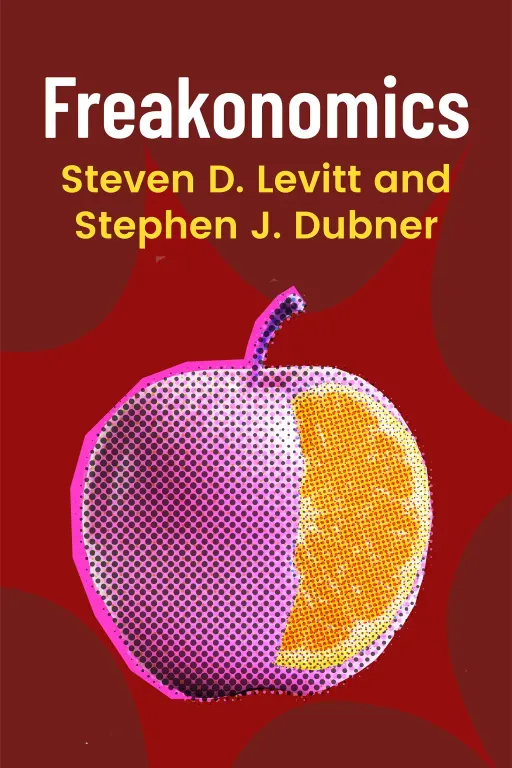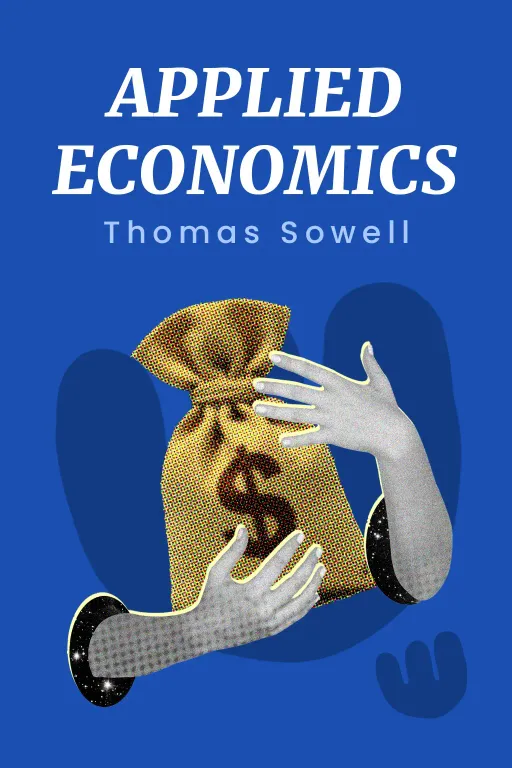
Freakonomics
10 minA Rogue Economist Explores the Hidden Side of Everything
Introduction
Narrator: In the early 1990s, criminologists, politicians, and journalists were united in a terrifying prediction. A new wave of "superpredators," remorseless teenage criminals, was about to unleash an unprecedented storm of violence upon America. President Clinton warned that the country had only six years to turn things around before descending into chaos. But then, something astonishing happened. The crime wave never came. Instead, crime rates began to plummet, falling faster and further than anyone had imagined. Homicides, theft, and assault all dropped dramatically. The experts were completely wrong. So, where did all the criminals go?
This is precisely the kind of riddle that economist Steven D. Levitt and journalist Stephen J. Dubner tackle in their groundbreaking book, Freakonomics: A Rogue Economist Explores the Hidden Side of Everything. The book argues that the world is governed by hidden rules and incentives that, once understood, can explain the most baffling human behaviors. It peels back the layers of conventional wisdom to reveal how the world actually works, not just how we wish it would.
Incentives are the Hidden Architecture of Modern Life
Key Insight 1
Narrator: At its core, Freakonomics posits that economics is the study of incentives. Understanding how people get what they want is the key to solving almost any puzzle of human behavior. However, incentives are not always straightforward and can lead to bizarre and unintended consequences.
Consider an Israeli day-care center struggling with parents who consistently arrived late to pick up their children. To solve the problem, the center introduced a small fine for late pickups. The economists running the study expected the financial penalty to deter lateness. Instead, the opposite happened: late pickups more than doubled. The fine had inadvertently replaced a moral incentive, which was the guilt parents felt for inconveniencing the teachers, with a simple market transaction. Parents now saw the fine as a fee they could pay for the convenience of being late. When the fine was later removed, the high rate of lateness persisted, as the old social norm had been permanently erased.
This power of incentives also has a dark side: cheating. When the stakes are high enough, people will find a way to game the system. In the 1990s, the Chicago public school system implemented high-stakes testing, where teachers could be promoted or fired based on their students' scores. The incentive was clear: improve test scores. An analysis of the data revealed something startling. In certain classrooms, an unusual pattern emerged where students' answers were changed from wrong to right at a statistically impossible rate. The teachers, facing immense pressure, were cheating. They were not bad people, but they were responding to a powerful incentive.
Information Asymmetry Creates Power
Key Insight 2
Narrator: Experts hold a powerful advantage over the average person: they know more than we do. This "information asymmetry" is a cornerstone of many professions, but it can be easily abused. The book draws a surprising parallel between the Ku Klux Klan and real estate agents to illustrate this point.
The KKK's power was not just in its violence, but in its secrecy. It hoarded information—secret codes, rituals, and membership lists—to create an aura of fear and mystique. Its members knew who was in the Klan, but outsiders did not, making the organization seem larger and more powerful than it was. This power began to crumble when an infiltrator named Stetson Kennedy leaked their secrets to the producers of the Superman radio show. Suddenly, the Klan's secret handshakes and passwords were being broadcast to children across the country, turning the fearsome organization into a national laughingstock. Their information advantage was gone, and their power diminished.
Similarly, a real estate agent knows far more about the housing market, a buyer's desperation, and the true value of a home than the client they represent. While their commission is tied to the sale price, the incentive structure is skewed. An extra $10,000 on a sale might mean thousands for the homeowner, but only an additional $150 for the agent. The agent's real incentive is to close the deal quickly. Data shows that when real estate agents sell their own homes, they leave them on the market longer and get a higher price than when they sell a client's home. They leverage their information advantage for their own benefit, not necessarily their client's.
Conventional Wisdom is a Fragile Construct
Key Insight 3
Narrator: Many of the things we believe to be true are simply convenient, comfortable narratives that haven't been tested against data. Freakonomics delights in dismantling this conventional wisdom. A prime example is the common perception of drug dealers. The media often portrays them as wealthy, powerful kingpins. The reality, uncovered by sociologist Sudhir Venkatesh, is far different.
Venkatesh embedded himself with a crack-dealing gang in Chicago and gained access to their financial records. He discovered that the gang operated much like a typical capitalist enterprise, such as McDonald's, but with a far more skewed pay structure. The leader at the top made a fortune, but the street-level "foot soldiers" who faced the daily risk of being arrested or killed earned less than minimum wage. So why did they do it? For the same reason aspiring actors move to Hollywood: the slim, lottery-like chance of making it to the top. The conventional wisdom was wrong. Most drug dealers weren't getting rich; they were living with their moms, hoping for a promotion that would likely never come.
Dramatic Effects Often Spring from Distant, Subtle Causes
Key Insight 4
Narrator: Returning to the mystery of the 1990s crime drop, the book dismisses most of the popular explanations. Innovative policing strategies? Crime fell just as much in cities that didn't adopt them. A booming economy? The data shows little connection between economic cycles and violent crime. Instead, Levitt and Dubner present a far more controversial and distant cause: the legalization of abortion.
The argument is based on a simple, yet startling, premise. The Supreme Court's 1973 Roe v. Wade decision gave millions of women, particularly those who were poor, unmarried, or teenagers, the ability to terminate unwanted pregnancies. Decades of research show that children born from unwanted pregnancies are statistically far more likely to live in poverty, have lower educational outcomes, and ultimately turn to a life of crime. The first generation of children who would have been born into these high-risk environments, had abortion remained illegal, would have reached their peak crime-prone years in the early 1990s. But they were never born. The data shows that states with the highest abortion rates in the 1970s saw the largest drops in crime twenty years later. The dramatic effect of the crime drop had a subtle cause that was set in motion two decades earlier.
A Name is an Indicator, Not a Cause, of Destiny
Key Insight 5
Narrator: Does a child's name determine their future? Many parents believe so, carefully selecting names they hope will lead to success. Freakonomics examines this belief and finds that a name is not a cause of success, but rather an indicator of the circumstances into which a child is born.
The book analyzes a massive dataset of California birth certificates, linking names to parental income and education. It finds that parents from different socioeconomic backgrounds choose vastly different names. A name like "DeShawn" is statistically more common among low-income, low-education families. Does the name itself hold him back? No. The data shows that a black child named DeShawn and a black child named Jake, if born to the same parents in the same circumstances, would have similar life outcomes. The problem is that the parents who name their child Jake tend to be more educated and have a higher income than the parents who name their child DeShawn. The name, therefore, doesn't cause the outcome; it is a powerful indicator of the parental background that does. A name is a reflection of the parents' world, and it is that world, not the name itself, that shapes a child's destiny.
Conclusion
Narrator: The single most important takeaway from Freakonomics is that the modern world is not as random or unknowable as it seems. Beneath the surface of everyday life, there is a hidden logic driven by incentives. If morality represents the world as we would like it to be, economics shows us how it actually is. The book challenges us to abandon our assumptions and gut feelings in favor of data.
Its most challenging idea is its dispassionate approach to emotionally charged topics like abortion and crime. By stripping away the moralizing and focusing purely on the data, Levitt and Dubner force us to confront uncomfortable truths. The ultimate question Freakonomics leaves us with is this: are you willing to question what you believe to be true and follow the data, no matter where it leads?









